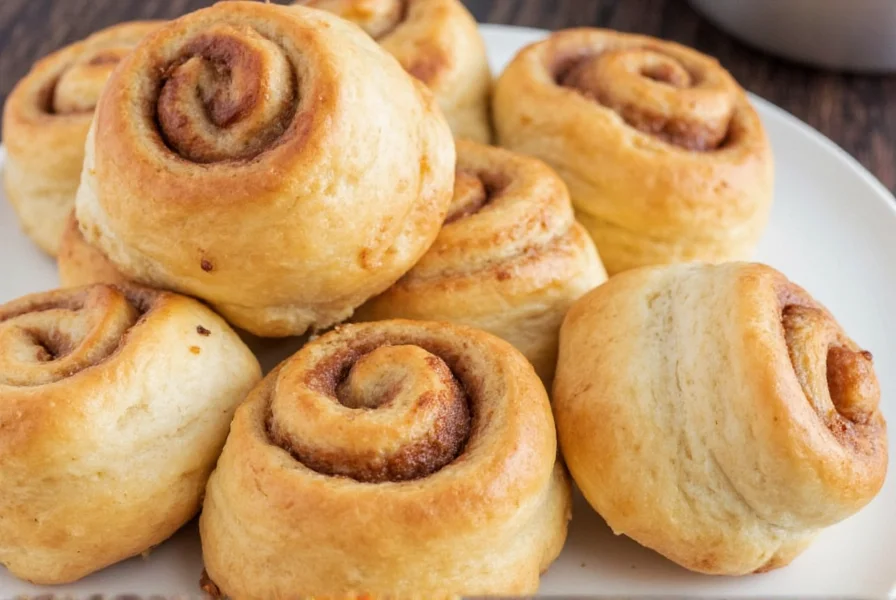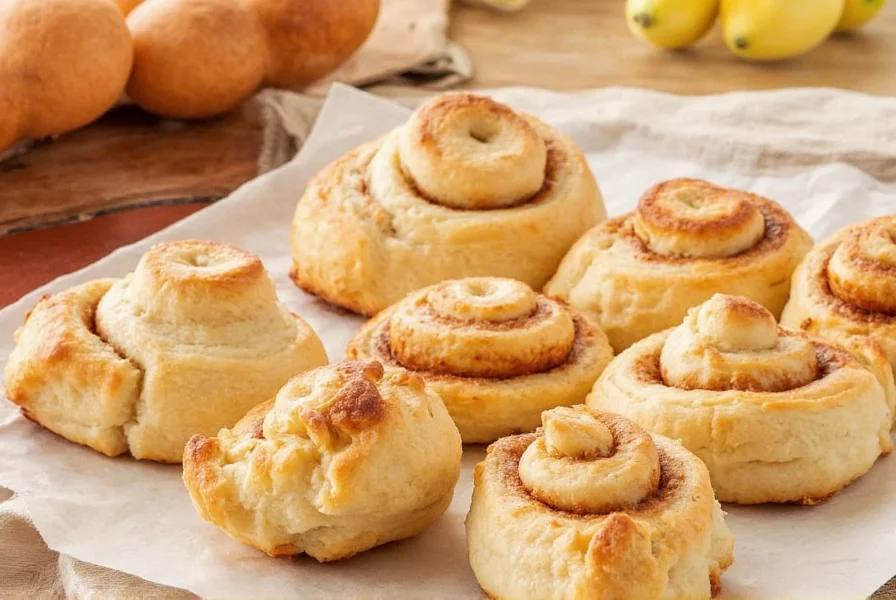When you're craving warm, gooey cinnamon rolls but don't have hours to spend on dough preparation and rising, puff pastry cinnamon rolls offer the perfect solution. This clever adaptation transforms the classic breakfast treat into an accessible delight that maintains the signature swirls and sweet filling while leveraging the convenience of ready-made puff pastry.
Why Choose Puff Pastry for Cinnamon Rolls?
Traditional cinnamon roll recipes require yeast dough that needs multiple rising periods, often totaling 3-4 hours of preparation time. Puff pastry cinnamon rolls eliminate this waiting period while delivering impressive results:
| Feature | Traditional Cinnamon Rolls | Puff Pastry Cinnamon Rolls |
|---|---|---|
| Preparation Time | 3-4 hours | 25-30 minutes |
| Skill Level | Intermediate | Beginner |
| Texture Profile | Soft, bready | Flaky, layered |
| Ingredient Count | 8-10 ingredients | 5-6 ingredients |
The magic happens because commercial puff pastry already contains hundreds of delicate butter layers that expand dramatically when baked, creating that signature flakiness without any yeast or rising time. This makes puff pastry cinnamon rolls ideal for last-minute breakfasts, brunch gatherings, or when you want to impress with minimal effort.
Essential Ingredients for Perfect Results
For the best puff pastry cinnamon roll experience, quality ingredients matter. You'll need:
- 2 sheets frozen puff pastry (thawed according to package instructions) - Look for brands with "all butter" in the ingredients for superior flavor
- ⅓ cup unsalted butter, softened to room temperature
- ½ cup packed light brown sugar - Provides that classic caramel note
- 2 tablespoons ground cinnamon - Freshly ground offers the brightest flavor
- 2 tablespoons heavy cream - For the perfect filling consistency
- 1 cup powdered sugar - For the glaze
- 1-2 tablespoons milk - Adjusts glaze thickness

Step-by-Step Preparation Guide
Follow these professional techniques for flawless puff pastry cinnamon rolls every time:
- Thaw pastry properly: Remove puff pastry from freezer and let thaw in refrigerator overnight or at room temperature for 30-40 minutes until pliable but still cold. Never microwave to thaw.
- Prepare filling: In a small bowl, combine softened butter, brown sugar, cinnamon, and heavy cream until smooth. The cream helps create a spreadable consistency that won't leak during baking.
- Roll pastry sheets: On a lightly floured surface, gently roll each thawed pastry sheet into a 12x14 inch rectangle, being careful not to compress the layers.
- Spread filling evenly: Leaving a ½ inch border, spread the cinnamon filling across the entire surface. Overfilling causes leakage during baking.
- Roll tightly: Starting from the long edge, roll the pastry into a tight log. Pinch the seam to seal. Chill for 10 minutes to firm up before cutting.
- Cut carefully: Using a sharp serrated knife, cut the log into 1½ inch slices. A serrated knife prevents squishing the delicate layers.
- Bake at correct temperature: Place rolls on a parchment-lined baking sheet with space between them. Bake at 400°F (200°C) for 18-22 minutes until golden brown and fully puffed.
Troubleshooting Common Issues
Even with this simplified recipe, certain challenges can arise. Here's how to address them:
- Soggy bottoms: This happens when the pastry doesn't reach proper internal temperature. Solution: Place baking sheet on the lowest oven rack for the first 10 minutes of baking to ensure the bottom cooks through.
- Filling leakage: Usually caused by overfilling or improper sealing. Solution: Leave that ½ inch border clean and ensure the seam is well-sealed before chilling.
- Uneven rising: Can occur if pastry isn't uniformly cold. Solution: Work with one sheet at a time while keeping the other chilled.
- Dry texture: Often results from overbaking. Solution: Check at 18 minutes - they're done when golden and fully puffed, not when deeply browned.
Creative Variations to Try
Once you've mastered the basic recipe, experiment with these delicious twists:
- Cheesecake swirl: Add 4 oz softened cream cheese to the filling mixture for a decadent twist
- Apple cinnamon: Thinly slice 1 small apple and layer between the pastry and filling
- Maple pecan: Replace brown sugar with maple sugar and add chopped toasted pecans
- Chocolate drizzle: After glazing, add a zigzag of melted dark chocolate
Storage and Reheating Tips
Puff pastry cinnamon rolls maintain their quality better than traditional versions due to their flakier structure:
- Room temperature: Store in an airtight container for up to 2 days
- Refrigerator: Keep for up to 5 days - reheat in oven for best texture
- Freezer: Freeze unbaked rolls on a baking sheet, then transfer to freezer bags. Bake from frozen, adding 5-7 minutes to baking time
- Reheating: For optimal results, warm in a 325°F (160°C) oven for 8-10 minutes rather than microwaving
Frequently Asked Questions
Can I use croissant dough instead of puff pastry for cinnamon rolls?
Yes, croissant dough works well but produces a different texture. Croissant dough contains yeast and will yield a softer, more traditional cinnamon roll texture with less flakiness. Baking time may need slight adjustment as croissant dough typically requires lower temperatures.
Why did my puff pastry cinnamon rolls flatten during baking?
This usually happens when the pastry becomes too warm before baking. Puff pastry relies on cold butter layers creating steam during baking. If the butter melts before going into the oven, the layers won't separate properly. Always chill the cut rolls for 10 minutes before baking and ensure your kitchen isn't too warm.
How can I prevent the filling from leaking out during baking?
To prevent filling leakage: 1) Leave a ½ inch border around the edges unfilled, 2) Ensure the pastry seam is well-sealed before chilling, 3) Use a filling with proper consistency (adding heavy cream helps), and 4) Don't overfill - ⅓ cup of filling per sheet is sufficient for optimal results.
Can I prepare puff pastry cinnamon rolls the night before?
Yes, you can prepare them ahead. After cutting the rolls, place them on a parchment-lined baking sheet, cover tightly, and refrigerate overnight. The next morning, let them sit at room temperature for 20-30 minutes while the oven preheats, then bake as directed. This slight warming helps the pastry rise properly.
What's the ideal oven temperature for puff pastry cinnamon rolls?
400°F (200°C) is the ideal temperature. This high heat is crucial for proper puffing as it quickly turns the water content in the butter to steam, creating those signature layers. Lower temperatures won't produce the same flakiness, while higher temperatures may cause burning before the interior cooks through.











 浙公网安备
33010002000092号
浙公网安备
33010002000092号 浙B2-20120091-4
浙B2-20120091-4